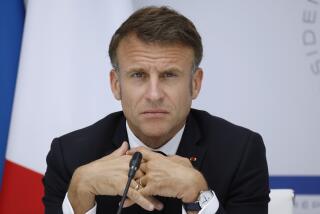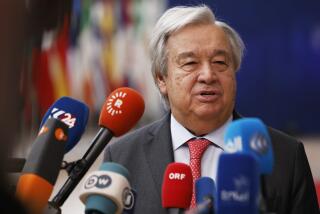European Union leaders offer moral support but no cash to Greece
- Share via
Reporting from London — European leaders lent their moral support but no hard cash to the Greek government Thursday in its struggle to tackle a debt crisis that has called the stability of the euro into question.
Financial markets responded with little enthusiasm to the expression of solidarity, pushing the euro down to one of its lowest rates against the dollar -- about $1.36 -- since last spring. The currency had staged a small rally this week on the strength of investor belief that the 27-nation European Union would unveil a rescue package for Athens at an economic summit Thursday in Brussels.
Instead, EU President Herman Van Rompuy said only that the 16-member Eurozone -- the group of countries that use the euro -- would take “determined and coordinated action” if needed to ensure stability across the zone.
He declined to specify what that action might be, and called on Greece to forge ahead with an austerity plan to bring down its runaway budget deficit from 12.7% of gross domestic product to more acceptable levels. The plan has sparked protests by civil servants and other groups angry about proposed cuts in pay and welfare spending.
“We fully support the efforts of the Greek government and their commitment to do whatever is necessary, including adopting additional measures, to ensure that the ambitious targets set in the stability program for 2010 and the following years are met,” Van Rompuy said.
Meetings of EU finance ministers next week could produce more concrete offers of support for Greece, particularly if traders continue to drive down the euro’s value.
Investors concerned that Greece might default on its loans had hoped the EU would extend concrete aid to the Mediterranean nation, perhaps in the form of direct country-to-country loans or loan guarantees. Without such help, analysts say, the crisis could spread to countries such as Portugal and Spain, which also face huge budget deficits.
The Eurozone’s two heavyweights, Germany and France, have been reluctant to bail out Athens, which they see as having acted irresponsibly and broken Eurozone rules on fiscal discipline.
“Greece won’t be left on its own, but there are rules, and they have to be respected,” German Chancellor Angela Merkel said before Thursday’s summit began.
But Berlin and Paris may have little choice in the end, as they too cannot afford an ongoing crisis of confidence in the euro. The Greek debt debacle has presented the currency with its severest test since it was launched in 1999.
Greek Prime Minister George Papandreou insisted Thursday that his beleaguered country did not need -- nor did it request -- any financial assistance from fellow EU states. However, Athens’ precarious situation has forced up the cost of government borrowing, and investors wonder whether Greece can raise the $72 billion it needs this year just to service its debt.
European officials have so far ruled out the possibility that Greece would seek loans from the International Monetary Fund, which would constitute a major embarrassment for the Eurozone. But Papandreou said Thursday that Athens would accept technical advice from the IMF.
More to Read
Sign up for Essential California
The most important California stories and recommendations in your inbox every morning.
You may occasionally receive promotional content from the Los Angeles Times.














